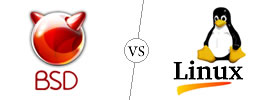Computers & Internet
BSD vs Linux
|
BSD and Linux are both types of operating systems that one can run on their computer. BSD and Linux are derivatives of the UNIX Operating System and they are both open source operating system. Under Linux’s... |
RDRAM vs SDRAM
|
SDRAM is a type of dynamic random-access memory that is synchronized with the system bus. RDRAM is a type of memory that can provide a fast current memory with a maximum speed of 100 MHz and transfers data up... |
IPv4 vs IPv6
|
IPv4 is the fourth version of IP and is widely employed. IPv6 version is a better and advanced version issued to deal with address exhaustion. IPv4 uses a 32-bit address format, while IPv6 uses a 128-bit... |
Having vs Where Clause
|
Both, ‘Having’ and ‘Where’ are clauses that can be utilized in SQL. The ‘Where’ clause is applied first to the individual rows in the tables, using which the rows that meet the conditions in the clause are... |
RTF vs TXT
|
TXT stands for plain text. Plain text is text that has no formatting, including any bold, italics or different font sizes. It is the basic text format. RTF, on the other hand, can include some form of... |













